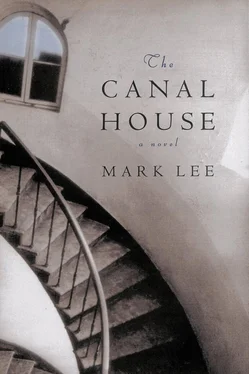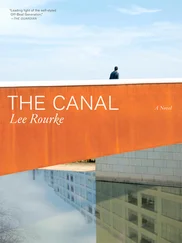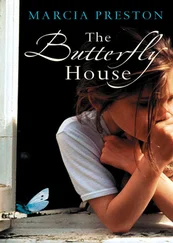“No moo,” the old man said. And then he made a deep bellowing sound that seemed to come from deep in his body, the sound of bride price and feasting, the sound of a dying tradition.
For the most part, the Karamojong hadn’t gotten involved in the civil war between the Muslims of northern Sudan and the Christians in the south, but a new general had come to power in Khartoum and decided to create a “wall of fire” surrounding his country. Mirage jets began dropping napalm on the cattle herds, and the Karamojong in Sudan fled across the border to Uganda.
The Gucci toiletry case seemed exotic and out of place next to all this, as if one of the Karamojong, naked and carrying his rifle, had appeared in the middle of Oxford Street. The case stayed beneath my folding cot and it began to make me feel guilty in the morning. I told myself that I should at least use the shampoo and hair rinse, but our shower was just a bucket on a pulley. It seemed completely awkward to place the frosted glass bottles on the red mud. I thought about using the makeup; the idea of putting it on in that heat was more than I could bear. Besides, there were so many other things that needed my attention. Someone was dying or being born. We were running low on antibiotics. One of the Ugandan soldiers who was supposed to be guarding the camp was swaggering around looking for available women, and the Karamojong men were ready to stick a knife through his ribs. Most days I was busy and occupied and there were times when I felt as if part of myself was disappearing, dissolved into the general need.
It was the white season in East Africa. The grass was brittle and dry, and the earth was cracked open as if gasping for water. After the sun went down, the wind blew east from Kenya. In the daytime, when the ground warmed up, the wind changed direction and came from the northwest so that it seemed as if it pushed the refugees across the border. The tents shuddered and flapped like a fleet of sailboats. Wind picked up the red dust and swirled it around the camp. Dust was in the bottom of our sleeping bags and in the toes of our boots. It got into the cooking pots and I could taste it in our food. Three days before Richard was to arrive, I went to the toiletry case to get some nail scissors and discovered that the glass bottles and the makeup were covered with dust. I hadn’t opened the case since London, but dust had forced its way through the brass zipper and settled in a faint red haze on the bottles. It smeared when I touched it with my hand.
WE ARE CONNECTED in large ways by a web of small decisions. I wanted to think that I had guided the direction of my life, but so much of what happens seems to be governed by coincidence and chance. Twelve hundred people were living at Kosana because I got a phone call and went to Cambridge for a conference and accidentally met Richard Seaton. At that time I was on contract with the British Department for International Development. I worked at a Sierra Leone hospital for three weeks at a time, then returned to London for a week of rest. There was no reason to take a lease on a flat so I was staying with my friend Laura in Islington. I had just fed her dog and was thinking about ordering take-away curry when Charles Hart called, a classmate of mine from medical school. Charles had worked in Rwanda after the genocide, but it had all been too much for him and he had gotten typhoid. Now he was a consultant for private foundations involved with international aid.
“Hello? Julia? I heard you were back from somewhere.”
“Sierra Leone.”
“God. That’s a disaster zone. What did I read about it in the Times? The Little Boys’ Army?”
“The Small Boys Unit. The Revolutionary United Front kidnaps them and gives them assault rifles.”
“Sounds hideous. You’re in Freetown, right? How’s it going?”
“There’s supposed to be a peace agreement, but it doesn’t mean much. The war lords are still in charge of the countryside. We’ve just gotten a power generator at the hospital. The petrol supply isn’t reliable, but I’m hopeful.”
“You always are.” Charles laughed as if he had gone beyond that and finally become an adult. “Look, we’re having a foreign aid conference at King’s College and I want to put you on a panel. Do say you’ll come. Lots of wine and good food. It’ll be a little holiday.”
I didn’t like conferences, but I wasn’t doing anything that weekend. Laura was traveling to Scotland with someone named Roger who shaved his head and designed nightclub lighting systems. I could have called up my friends Susan and Michael and gone over to their flat for dinner. But they’d gotten married that summer and were buying furniture together. I was happy for them, but I wasn’t in the mood to see their settled life.
“All right,” I told him. “I’ll be there.” I packed my one good dress and borrowed a pair of shoes from Laura.
Cambridge hadn’t changed much, just a few more gourmet restaurants on Sydney Street. The conference had the usual mix of participants: a few young aid workers who had actually touched starving people but didn’t want to mention it, plus aid administrators from the government and international NGOs who didn’t know much but did most of the talking. After the first two hours, Laura’s shoes began to hurt my feet. The welcoming speeches were a tepid flood of murky sentences with a few real words floating along by themselves. Mumble. Mumble. Hunger . Mumble. Mumble. AIDS . I began to wish that I was back at the flat, eating chocolate and watching Roman Holiday on television.
My panel was supposed to discuss emergency medical relief aid. I spoke for a few minutes, answered some questions, and didn’t make a complete fool of myself. Afterward I got ready to slip away. I thought I could change my shoes and take a walk along the river. There’d be willows reaching down to the water and, perhaps, some swans. I had unfastened my name tag and reached the hallway when someone called my name.
“Excuse me? Dr. Cadell?”
I turned. A man in his early forties, blond, with pale blue eyes, was smiling at me. He wore a tweed jacket and carried an expensive leather portfolio. Some sort of academic, I thought, the sort of person who reviewed books for the Guardian and gave end-of-term parties at which the students actually had a good time.
“I was impressed by your comments, Dr. Cadell. I’m sure it was difficult to run a clinic in Sarajevo.”
“It was a challenge, but I enjoyed that. Relief work is medicine without the nonsense.”
“Listen, I—oh, I should introduce myself—I’m Richard Seaton. Charlie Hart is a friend of mine. He thought I could learn a few things this weekend.”
“I see. Have you?”
“Yes. It’s all been rather informative, especially hearing your remarks. I wondered if we could have a drink together. Tea. Or something stronger. Whatever you want.”
“Thanks, but actually, I was going to take a walk.”
“Brilliant. I’d like to get out of here for a few hours.” Richard smiled again. He was very sure of himself without being overbearing about it. “I’ve always hated schools and seminar rooms. Chalkboards make me sneeze.”
I changed my shoes and we took a taxi to the River Cam and walked through the Backs. I’ve always liked rivers. It’s not just their sound and the damp smell and the birds, but the feeling that a river is going somewhere; if you just pushed your boat off from the shore, the rushing water would carry you away. I never thought of a destination in these daydreams; it was the sense of escape that inspired me.
I began thinking how I’d describe Richard when I saw Laura on Sunday. He was in that special category she called a CSM: a clever, single man. Single was an assumption on my part—Richard never mentioned a wife—but the cleverness was quite evident. I didn’t have to explain everything to him. If I described the outline of an idea, he immediately grasped the whole, and the conversation could move forward, skipping and dashing along with a quick rhythm.
Читать дальше












